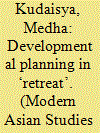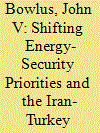| Srl | Item |
| 1 |
ID:
139686


|
|
|
|
|
| Summary/Abstract |
This article concerns the history of economic planning in India in the late 1960s, when a vigorous debate took place on the institutions, instruments, and ‘personnel’ of developmental planning. Examining the years from 1967 to 1971, this article shows how dramatic attempts were made by warring politicians with the help of technocrats to decentralize economic planning, grant states more fiscal autonomy, and drastically reduce the powers of the Planning Commission. This article examines how these critical economic initiatives unfolded but were ultimately overshadowed by political power struggles in which the planning process and the Planning Commission became important tools in attempts for centralization.
|
|
|
|
|
|
|
|
|
|
|
|
|
|
|
|
| 2 |
ID:
179080


|
|
|
|
|
| Summary/Abstract |
On January 31, 1969, Iran’s Shah Mohammad Reza Pahlavi met in Zurich with representatives from the British-American-French-Dutch-owned Iran Oil Consortium (hereafter the “Consortium”) to discuss a variety of issues, including the proposal to build an oil pipeline from Iran to Turkey. In a “dispassionate” tone, according to the second highest ranking official at the U.S. Embassy in Tehran, Minister-Counselor Nicholas G. Thacher, the Shah admitted that the pipeline to Turkey “was not one of his pet projects and [that] the validity of the line must be judged solely on economic grounds.” The Shah’s tepid support was due, ultimately, to his preference for other options to transit Iranian oil exports to Europe. Instead of committing to a landlocked pipeline through a single country, the Shah and Consortium preferred the flexibility offered by large seaborne tankers and the security of using a new pipeline in Israel that bypassed the closed Suez Canal.
|
|
|
|
|
|
|
|
|
|
|
|
|
|
|
|